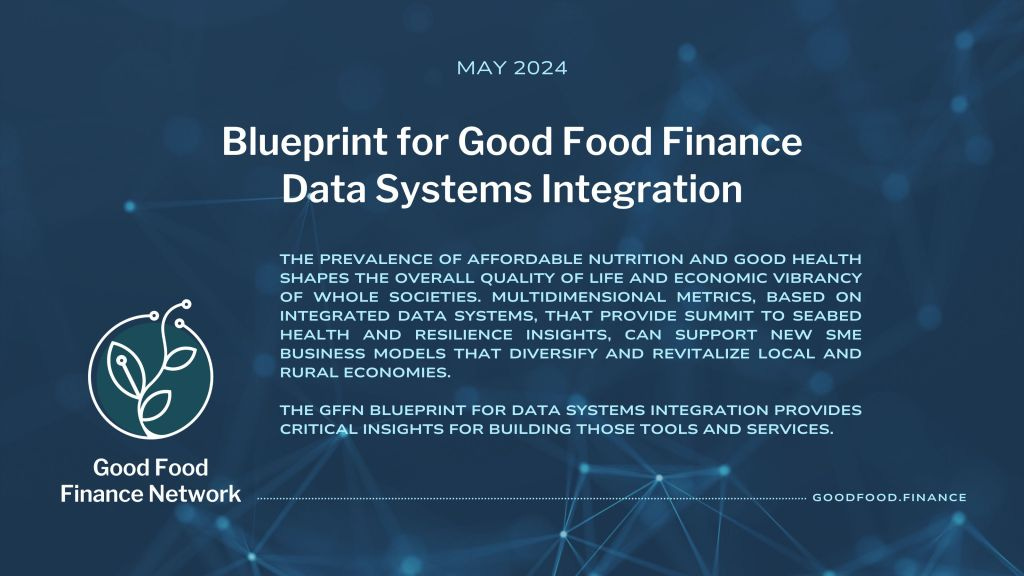Blueprint for Good Food Finance Data Systems Integration to track high-value co-benefits
Good Food Finance Network report on data systems integration will inform development of multidimensional metrics that track food systems investment, performance, and impacts.
The Integrated Data Systems Initiative is a five-year innovation sprint, organized by the Good Food Finance Network (GFFN) and recognized by the 2023 Agriculture Innovation Mission (AIM) for Climate Summit. The GFFN ‘Blueprint for Good Food Finance Data Systems Integration’ marks the culmination of Year 1 of that sprint.
When we examine the landscape of need, capability, frontier innovation, and emerging models for sustainable food systems enterprise, we find that actors at all scales, across the spectrum from the most well-funded to the most marginal constituencies, need robust, detailed, actionable insights about the degree of value-building or value-destroying impact of their choices. Integration of data systems is a critical step toward reliable, everyday, mainstream metrics for decision-making that builds resilience, improves health, and fosters prosperity open to all.
Key messages
From the body of exploratory work outlined in the report, we find that food systems finance will need to interact with and deploy insights from a broad and diverse range of data sources, interested parties, public good priorities, and innovative enterprise solutions. The following key messages stand out:
Never before in human history has it been more important that we understand the extent of our impacts on the Earth system and its ecological life-supports.
We need to develop data systems that are complex enough to not misrepresent the complexities of the living world, while producing integrated metrics that are easy to understand and act on, even for non-experts.
The prevalence of affordable nutrition and good health shapes the overall quality of life and economic vibrancy of whole societies.
Multidimensional metrics, based on integrated data systems, that provide summit to seabed health and resilience insights, can support new SME business models that diversify and revitalize local and rural economies.
Human industrial systems are having an unsustainable far reaching degrading impact on nature, planetary health and human health. The combine costs of unsustainable food systems over just the last eight years are projected to be $124 trillion.
The critical ecosystems, biodiversity and watersheds on which agriculture depends are all facing unprecedented sustained pressure.
Rates of acute hunger and near famine condition have spread across the world since the onset of the Covid pandemic.
Climate change is rapidly moving towards costly compounding impacts that nearly all nations cannot handle on their own.
The food economy at local and regional levels and across International supply chains is not only unsustainable; it suffers from pervasive inefficiencies that make it difficult for most food value chain contributors to make a reliable living.
One of the highest value outcomes of integrated data systems to support good food finance for all is the potential for innovative, small and medium sized enterprises (SMEs) to diversify and revitalize the economic life of marginal, rural, and underserved communities. Examples of this might include small local soil ecology finance companies that manage and downscale finance, while aggregating and upscaling traceable Earth systems observation data.
We know for instance that smallholder farmers can produce rapid scaling up of nature, positive and climate smart production practices—if they have access to best practice insights, bridging funds and other right-scaled financial support, and data services that communicate to a wider marketplace the value of their hard work.
We also know that healthcare costs and related economic losses linked to diet-related noncommunicable diseases (NCDs) and various forms of malnutrition, are putting increasing pressure on public sector budgets and can result in reduced incentive for outside investment in a city or region.
Data systems that connect macroscale health information Earth systems insights, farmer livelihoods, and public subsidies, can make clear where there is increased medium- and long-term value linked to specific investment choices.
For instance, some crops are primarily grown in ways that deplete soil fertility, soil moisture, and overall watershed resilience. These practices have an adverse effect on climate stability, which in turn makes it more difficult to produce the volume of food needed for a growing global population.
Engineering multidimensional metrics
The Integrated Data Systems Initiative was launched by the EAT Foundation in May 2023, building on three years of discussions among experts, practitioners, and innovators. It is now led by Citizens’ Climate International, through its Resilience Intelligence program, with support from Good Food Finance Network partners.
In 2024 and 2025, as the Integrated Data Systems Initiative moves into exploratory integrations—involving technology, networks, platforms, and datasets across overlapping geographies and timescales—we aim to develop more focused versions of this work. Areas of focus will include:
nutrition and health outcomes, including nutrition security and the sustainability of production practices leading to more nutritious foods, ethical treatment of animals, and the co-benefits to such practices that markets have tended to ignore;
local context for Planetary Health Diet insights across food system value chains;
climate risk and resilience value added by specific production practices or business model innovations across the value chain, including for the benefit of attracting new flows of investment into local and national economies;
how specific samples of data systems integration can support new business models that diversify, revitalize, and create more long-term sustainable prosperity in local economies, including for just rural transition and improved rural livelihoods.
Links & Resources
The Blueprint for Good Food Finance Data Systems Integration (PDF)
Nature Metrics: measuring progress and catalyzing investment in sustainable food systems
The Right to Resilience – Will the future be livable or unlivable?
Article 6.8 of the Paris Agreement invites integrated data systems
The Climate Value Exchange – global partnerships platform for multidimensional climate cooperation
Good Food Finance Facility – An emerging co-investment platform for food systems transformation


